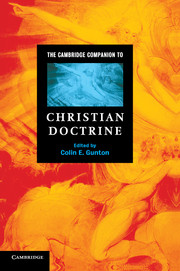Book contents
- Frontmatter
- Part one Christian doctrine in the late twentieth century
- 1 Historical and systematic theology
- 2 On doctrine and ethics
- 3 The basis and authority of doctrine
- 4 The scope of hermeneutics
- 5 Christ and the cultures: The Jewish people and Christian theology
- 6 Christ and the cultures: Christianity and the arts
- Part two The content of Christian doctrine
- 7 The triune God
- 8 The doctrine of creation
- 9 Human being, individual and social
- 10 Redemption and fall
- 11 The church and the sacraments
- 12 Eschatology
- 13 Jesus Christ
- 14 The Holy Spirit
- General index
- Index of biblical references
2 - On doctrine and ethics
Published online by Cambridge University Press: 28 May 2006
- Frontmatter
- Part one Christian doctrine in the late twentieth century
- 1 Historical and systematic theology
- 2 On doctrine and ethics
- 3 The basis and authority of doctrine
- 4 The scope of hermeneutics
- 5 Christ and the cultures: The Jewish people and Christian theology
- 6 Christ and the cultures: Christianity and the arts
- Part two The content of Christian doctrine
- 7 The triune God
- 8 The doctrine of creation
- 9 Human being, individual and social
- 10 Redemption and fall
- 11 The church and the sacraments
- 12 Eschatology
- 13 Jesus Christ
- 14 The Holy Spirit
- General index
- Index of biblical references
Summary
PROBLEMATISING THE RELATION BETWEEN DOCTRINE AND ETHICS
Strange as it may seem, [the] general conception of ethics coincides exactly with the conception of sin. So we have every reason to treat it with circumspection. We do take up the question of the good and we try to answer it. But there can be no more trying to escape the grace of God. On the contrary, we have to try to prevent this escape. When we speak of ethics, the term cannot include anything more than this confirmation of the truth of the grace of God as it is addressed to man. If dogmatics, if the doctrine of God, is ethics, this means necessarily and decisively that it is the attestation of that divine ethics, the attestation of the good of the command issued to Jesus Christ and fulfilled by Him. There can be no question of any other good in addition to this.
Any account of the relation between Christian doctrine and ethics must take account of this passage from Karl Barth. By 'take account' I mean at the very least we need to understand Barth's claim that the general conception of ethics coincides with the conception of sin.
- Type
- Chapter
- Information
- The Cambridge Companion to Christian Doctrine , pp. 21 - 40Publisher: Cambridge University PressPrint publication year: 1997
- 2
- Cited by

